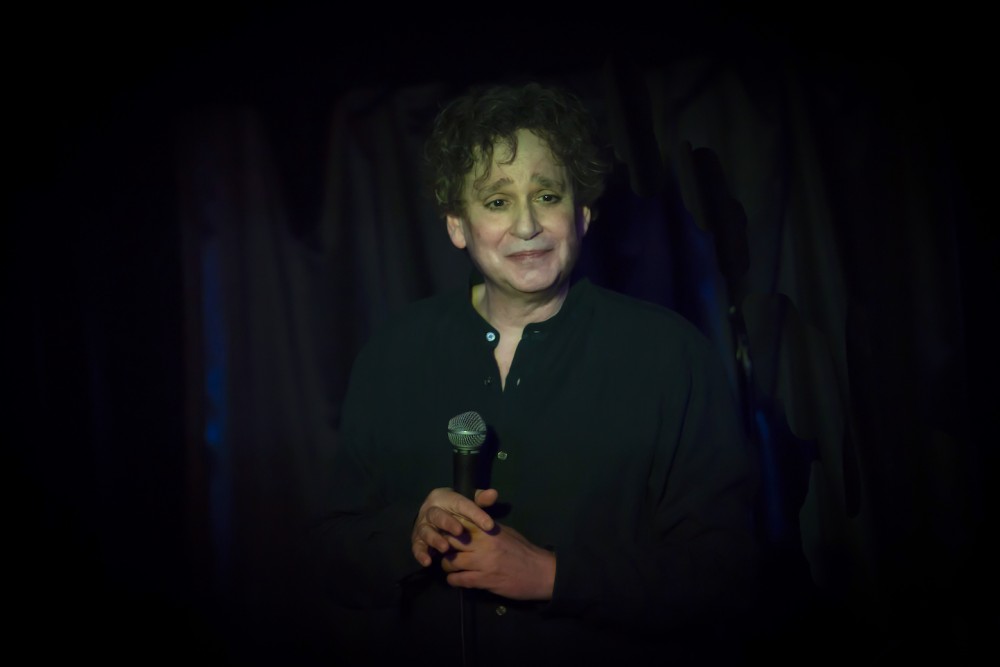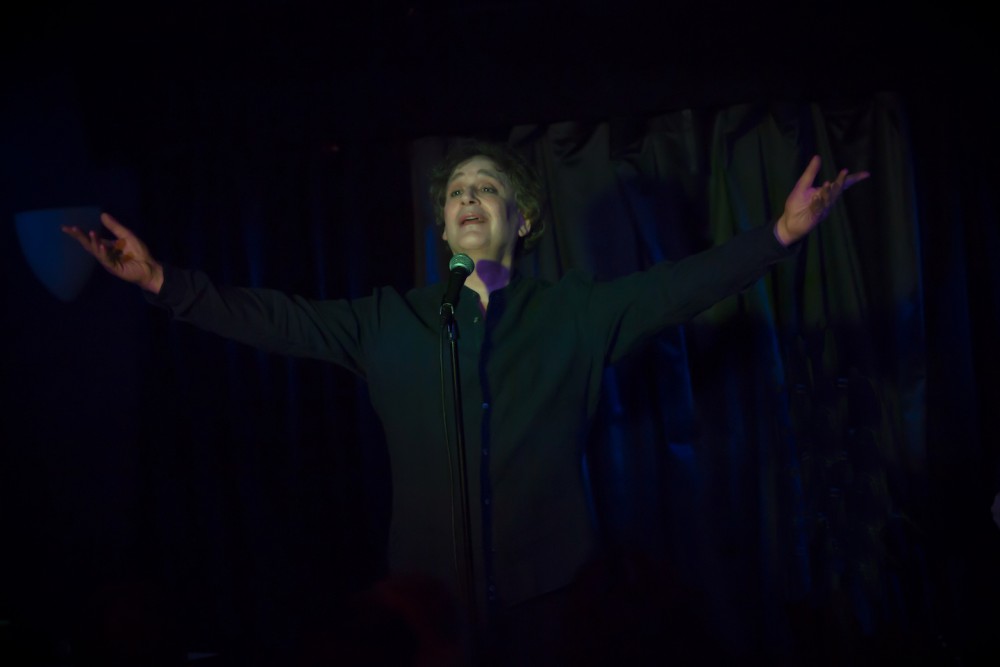by Myra Chanin
On April 22, 2018 60 lucky cabaret lovers squeezed into the 60 seats in the normally 50-seat Pangea, an East Village oasis for food, drink and cutting-edge cabaret, to see Sidney Myer’s new one-man show. Every Sidney Myer performance is special, but his Pangea show was triply distinct because Sidney was ready to break fresh ground artistically.
Everybody loves Sidney Myer, who for 30 years has been cabaret manager at Don’t Tell Mama, because he’s kind, supportive and generous. He’s also a unique and extremely talented entertainer whose forte is performing neglected early 20thCentury ditties in a devilishly naïve, insinuation-laden au courant style. In the past, when Sidney participated in group shows, he sang two songs, stopped the show and reappeared for the curtain calls; however, at the 2017 Cabaret Convention Sidney was scheduled to perform on the night devoted to biographer James Gavin’s book, Intimate Nights: The Golden Age of New York Cabaret. The illustrious TWEED producer/director, Kevin Malony, hired to stage that evening’s performance, shuffled things around. He had Sidney sing “I’d Rather Cha Cha than Eat,” during the first act, open the post-intermission portion with “Peel Me a Grape,” remain on stage with Gavin and the featured comedian Bruce Villanch and end the evening singing the late John Wallowitch’s exquisite ballad “This Moment,” simply, unadorned and heartfelt.
To Sidney’s surprise, Kevin Malony asked him to participate in a Cutting Room concert celebrating Joni Mitchell, who became prominent considerably after the period Sidney normally mines for material. He asked him to sing her ‘You Turn Me On, I’m a Radio,” a somewhat tuneless country hit in my opinion which Sidney had never heard. Sidney and his music director, Tracy Stark, worked the song over and over but he remained unsure of how to handle it. He finally decided to sing it slowly, simply and honestly and that’s what he did … to a room filled with Mitchell worshippers. When he finsihed, the room was silent. Oy vey! He was sure he’d really screwed up until the cheering started to his relief and delight. Afterwards, Malony said to him, “I knew I was right.”
Malony, also the resident producer at Pangea, spoke to Stephen Shanaghan, Pangea’s co-owner/booking manager, about offering Sidney a one-night one-man show. Told he could do whatever he wanted, Sidney decided to include contemporary material that would appeal to hip Pangea patrons. Sidney and longtime director, Peter Schlosser, developed a 14-song program – five tried and true, the rest deliciously new. Juxtaposing Sidney’s sly, show-stopping gems with more avant garde and emotional material intrigued them. They added a gay suggestive angle where appropriate and concentrated on expressing the feeling in the ballads. Sidney was ready to unveil more of himself to an audience now primed to accept it.
Applause accompanied Sidney, nondescriptly attired, as he moved toward Tracy Stark at the piano and Bassist Tom Hubbard, singing “I May Never Go Home Anymore.” At the perfect moment, he roguishly crossed his arms like a hornpipe dancer and sang out a line of the lyric,
“That’s what sailors are for!” He continued the naval motif with “You’re the sail of my love boat, you’re the captain and crew,” from another 1920’s hit, adding, “Ship Ahoy! with an arm flourish before concluding the medley with two ordinary songs that proved he could even make innocuous lyrics sound meaningful.
Sidney turned Francesca Blumenthal’s witty “Between Men,” spare time self-improvement aids for lonely women, “taking French conversation and finding options beside playing Barbie to Ken,” into equally suitable for the parties at the end of a male-male affair. In “Faith, Hope and Charity,” Charity triumphed when she proved it began at home. Joan Cushing’s “Pheromones,” a longtime Myer classic, as usual, regaled the crowd. Waves of laughter followed Steven Lutvak’s “Dinner Party,” about his baseborn grandfather finding a livelihood at the palace of the Czar. Sidney laid the audience even lower with Chuck Prentiss’s ballad “Mary Kohn,” sometimes spelled maricon, the name strangers call the singer whenever he enters a room.
The show moved toward its conclusion with two hot, hot, gender irrelevant love songs which had originally been written for and about two males. “Dance with Me, Slow,” by Mark Sonnenblick for his musical Midnight at the Never Get, had languorous pacing and seductive lyrics. It’s opening phrase, “Hey, where are you racing,” made you want to give someone you love your all. In the second song, Sonnenblick supplied the lyrics for Ben Wexler’s melody, “All I Saw was You.” It was an anti-travelogue about a week in Paris where “we skipped the Eiffel Tower … toured the Marriott lobby … never left our room.” Who wouldn’t sign up for that trip?
What came next was totally unexpected and astonishing. Sidney riffed for 15 uproarious minutes about his unawesome entry into New York life in the 1980’s where he started as a file clerk at the United States Rubber Shippers, then sashayed into The Magic Pan creperie where, after becoming Mr. Sidney, a low-level host/greeter, he worked his way up to the less lowly lunch crew and finally advanced to lofty dinner crew heights, thanks to support from the manager, Mr. Don and Miss Mary, who’d flown in from LA to attend his show. Sidney’s storytelling, spontaneous and every word true, was funnier than Woody Allen at his peak and far more amusing than anything I’ve read in The New Yorker in the past decade!
Sidney closed with his tried and true, “So Nice to Have a Man Around the House,” and “Good Advice” but for his encore he returned to the tender ballad he’d originally sung for Kevin Malony, John Wallowitch’s “This Moment,” which says that life is all about this morning and it certainly was.
Photos: Albie Mitchell
Pangea 178 Second Avenue 10003. 212 995-0900 www.pangeanyc.com





















